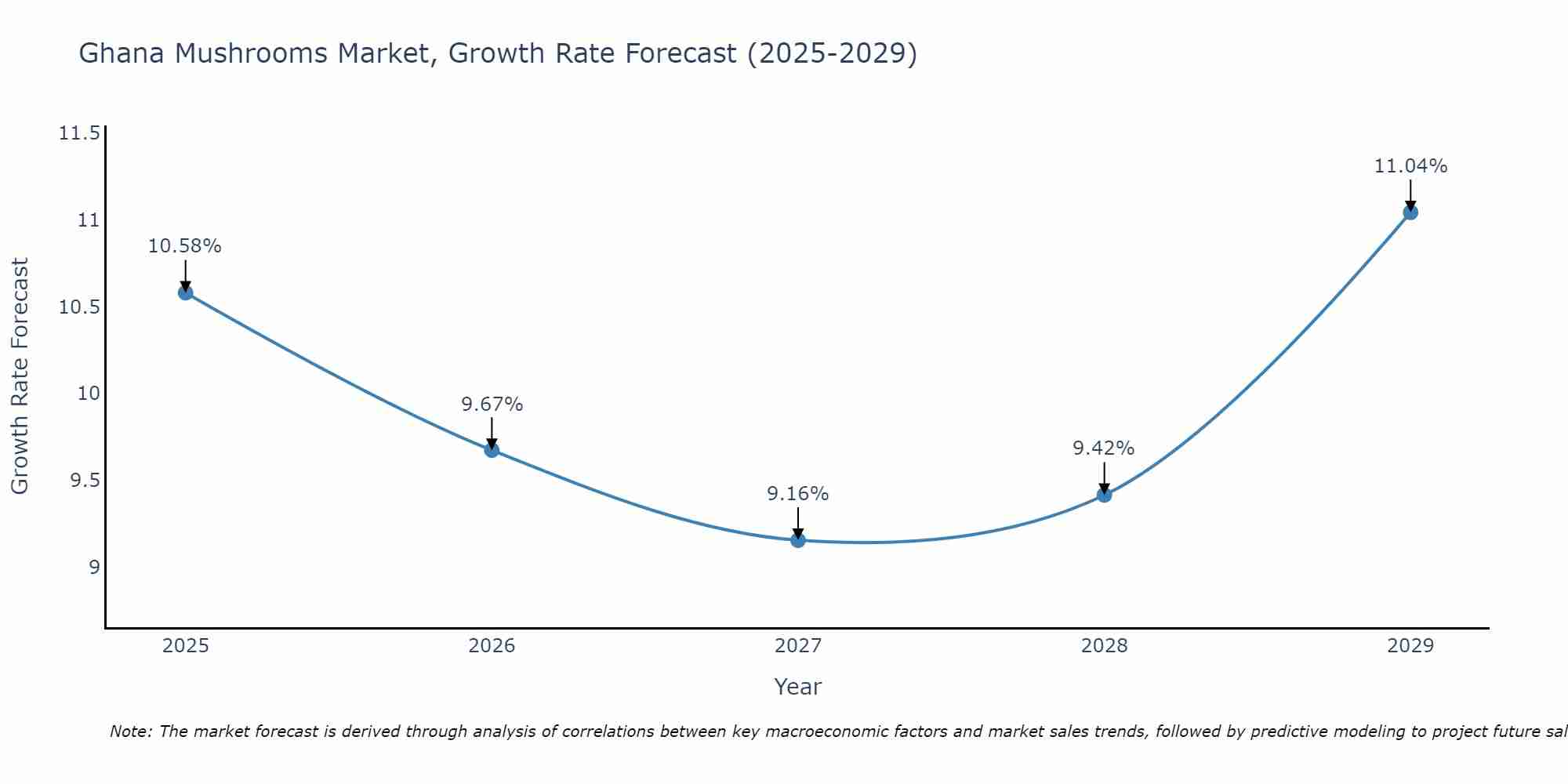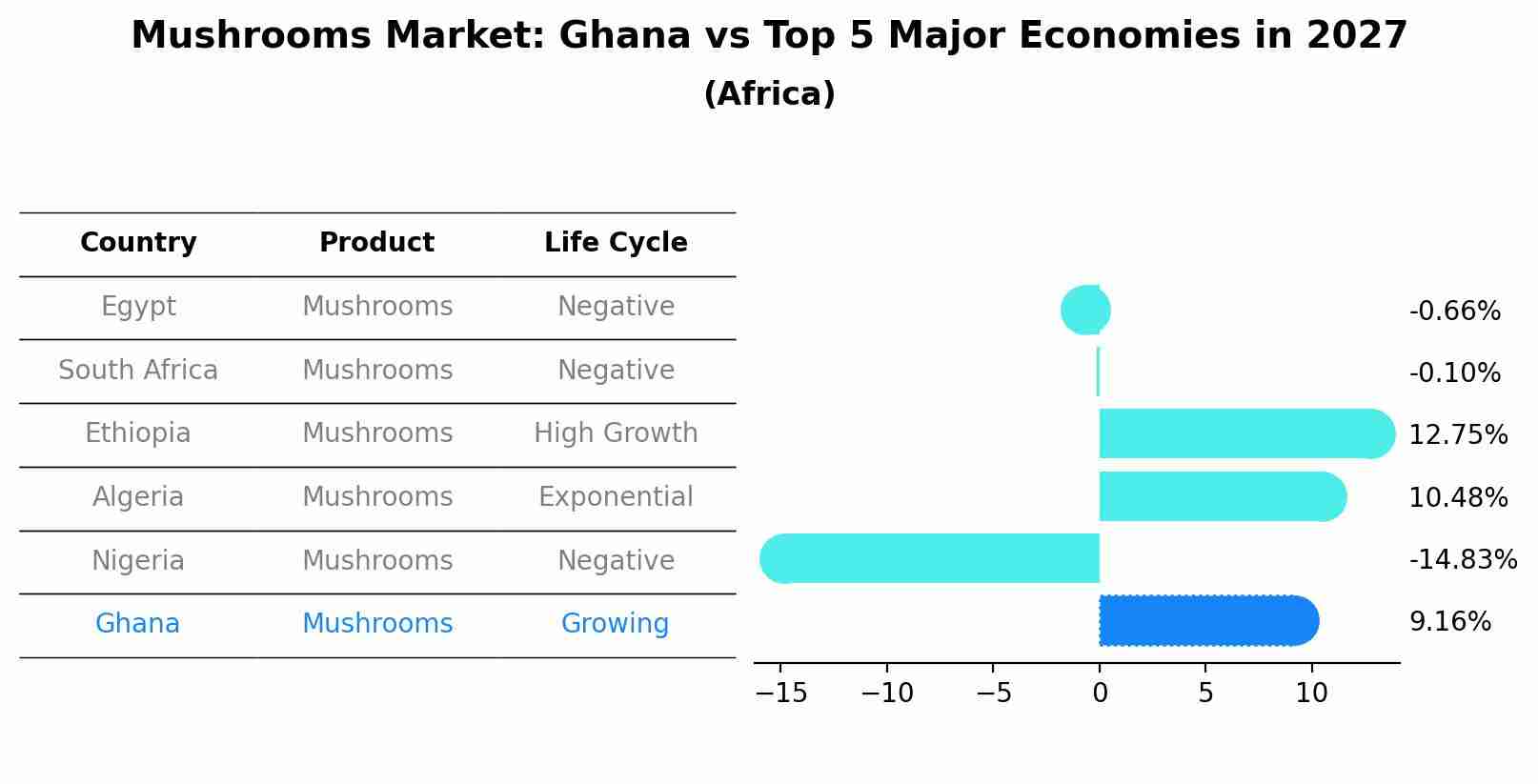Ghana Mushrooms Market (2025-2031) Outlook | Size, Analysis, Revenue, Growth, Companies, Share, Industry, Value, Forecast & Trends
| Product Code: ETC383216 | Publication Date: Aug 2022 | Updated Date: Jul 2025 | Product Type: Market Research Report | |
| Publisher: 6Wresearch | Author: Ravi Bhandari | No. of Pages: 75 | No. of Figures: 35 | No. of Tables: 20 |
Ghana Mushrooms Market Size Growth Rate
The Ghana Mushrooms Market is projected to witness mixed growth rate patterns during 2025 to 2029. Commencing at 10.58% in 2025, growth builds up to 11.04% by 2029.

Mushrooms Market: Ghana vs Top 5 Major Economies in 2027 (Africa)
By 2027, the Mushrooms market in Ghana is anticipated to reach a growth rate of 9.16%, as part of an increasingly competitive Africa region, where Egypt remains at the forefront, supported by South Africa, Ethiopia, Algeria and Nigeria, driving innovations and market adoption across sectors.

Ghana Mushrooms Market Synopsis
The Ghana mushrooms market is witnessing steady growth due to increasing awareness of the health benefits associated with mushrooms consumption. Mushrooms are becoming popular among Ghanaian consumers for their nutritional value, versatility in cooking, and unique taste. Local mushroom farmers are expanding their production to meet the growing demand, while also exploring innovative cultivation techniques to improve yield and quality. The market is characterized by a variety of mushroom types, including oyster mushrooms, shiitake, and button mushrooms, with oyster mushrooms being the most commonly produced and consumed variety. With the rise of health-conscious consumers and the culinary diversity in Ghana, the mushrooms market is expected to continue its growth trajectory in the coming years.
Ghana Mushrooms Market Trends
The Ghana mushrooms market is experiencing a growing trend towards consumption of exotic and specialty mushroom varieties, such as oyster, shiitake, and lion`s mane mushrooms. Consumers are increasingly seeking out these varieties for their unique flavors, textures, and potential health benefits. There is also a rising interest in locally grown and organic mushrooms, as consumers become more conscious of sustainability and environmental impact. The market is witnessing an expansion in mushroom cultivation and production techniques, with a focus on quality and freshness. Additionally, there is a growing demand for processed mushroom products, such as powders, extracts, and supplements, indicating a shift towards incorporating mushrooms into a wider range of food and wellness products.
Ghana Mushrooms Market Challenges
In the Ghanaian mushrooms market, some of the key challenges include limited consumer awareness and acceptance of mushrooms as a staple food item, inconsistent quality and supply of mushrooms due to seasonal variations and reliance on small-scale production, inadequate infrastructure for storage and distribution, high post-harvest losses, and limited access to technology and resources for mushroom cultivation. Additionally, there may be challenges related to competition from other food products, lack of government support and policies to promote the mushroom industry, and difficulty in accessing markets both domestically and internationally. Overcoming these challenges will require concerted efforts to educate consumers, improve production practices, invest in infrastructure, develop supportive policies, and enhance market linkages for sustainable growth of the mushrooms market in Ghana.
Ghana Mushrooms Market Investment Opportunities
The Ghanaian mushrooms market presents promising investment opportunities due to increasing consumer awareness of the health benefits of mushrooms and a growing demand for organic and locally sourced food products. Investors can consider opportunities in mushroom farming and production, as well as value-added products such as mushroom powders, extracts, and supplements. With the government`s focus on promoting agricultural development and supporting small-scale farmers, there are incentives and initiatives in place to encourage investment in the sector. Additionally, the export potential of Ghanaian mushrooms to international markets provides further opportunities for growth and expansion. Collaborating with local farmers, investing in research and development, and establishing distribution channels can help capitalize on the growing market demand for mushrooms in Ghana.
Jordan Agar Market Government Policies
The Ghanaian government has implemented various policies to support the growth of the mushrooms market in the country. These policies include the establishment of the Ghana Green Label Scheme to promote the production and consumption of locally grown mushrooms, as well as the implementation of training programs and capacity-building initiatives to enhance the skills of mushroom farmers. Furthermore, the government has provided financial support through grants and loans to facilitate the expansion of mushroom cultivation operations. Additionally, there are regulations in place to ensure the quality and safety of mushrooms produced in Ghana, with inspections and certifications conducted by relevant authorities. Overall, these policies aim to stimulate the development of the Ghana mushrooms market, increase domestic production, and improve the competitiveness of local mushroom farmers.
Ghana Mushrooms Market Future Outlook
The future outlook for the Ghana mushrooms market appears promising, with growing consumer awareness of the health benefits and culinary versatility of mushrooms driving demand. The increasing trend towards plant-based diets and the rising interest in sustainable food sources are expected to further boost the market. Additionally, advancements in production techniques and the expansion of mushroom cultivation in Ghana are likely to improve supply chain efficiency and ensure a steady availability of fresh mushrooms in the market. As the market continues to evolve, opportunities for product innovation, value-added mushroom products, and expansion into new distribution channels are expected to arise, making the Ghana mushrooms market a lucrative sector for industry players and investors alike.
Key Highlights of the Report:
- Ghana Mushrooms Market Outlook
- Market Size of Ghana Mushrooms Market, 2024
- Forecast of Ghana Mushrooms Market, 2031
- Historical Data and Forecast of Ghana Mushrooms Revenues & Volume for the Period 2021 - 2031
- Ghana Mushrooms Market Trend Evolution
- Ghana Mushrooms Market Drivers and Challenges
- Ghana Mushrooms Price Trends
- Ghana Mushrooms Porter's Five Forces
- Ghana Mushrooms Industry Life Cycle
- Historical Data and Forecast of Ghana Mushrooms Market Revenues & Volume By Product for the Period 2021 - 2031
- Historical Data and Forecast of Ghana Mushrooms Market Revenues & Volume By Button for the Period 2021 - 2031
- Historical Data and Forecast of Ghana Mushrooms Market Revenues & Volume By Shiitake for the Period 2021 - 2031
- Historical Data and Forecast of Ghana Mushrooms Market Revenues & Volume By Oyster for the Period 2021 - 2031
- Historical Data and Forecast of Ghana Mushrooms Market Revenues & Volume By Matsutake for the Period 2021 - 2031
- Historical Data and Forecast of Ghana Mushrooms Market Revenues & Volume By Truffles for the Period 2021 - 2031
- Historical Data and Forecast of Ghana Mushrooms Market Revenues & Volume By Other for the Period 2021 - 2031
- Historical Data and Forecast of Ghana Mushrooms Market Revenues & Volume By Form for the Period 2021 - 2031
- Historical Data and Forecast of Ghana Mushrooms Market Revenues & Volume By Fresh for the Period 2021 - 2031
- Historical Data and Forecast of Ghana Mushrooms Market Revenues & Volume By Processed for the Period 2021 - 2031
- Historical Data and Forecast of Ghana Mushrooms Market Revenues & Volume By Distribution Channel for the Period 2021 - 2031
- Historical Data and Forecast of Ghana Mushrooms Market Revenues & Volume By Direct to Customer for the Period 2021 - 2031
- Historical Data and Forecast of Ghana Mushrooms Market Revenues & Volume By Grocery Stores for the Period 2021 - 2031
- Historical Data and Forecast of Ghana Mushrooms Market Revenues & Volume By Supermarkets & Hypermarkets for the Period 2021 - 2031
- Historical Data and Forecast of Ghana Mushrooms Market Revenues & Volume By Convenience Stores for the Period 2021 - 2031
- Historical Data and Forecast of Ghana Mushrooms Market Revenues & Volume By Online Stores for the Period 2021 - 2031
- Historical Data and Forecast of Ghana Mushrooms Market Revenues & Volume By Application for the Period 2021 - 2031
- Historical Data and Forecast of Ghana Mushrooms Market Revenues & Volume By Food for the Period 2021 - 2031
- Historical Data and Forecast of Ghana Mushrooms Market Revenues & Volume By Pharmaceutical for the Period 2021 - 2031
- Historical Data and Forecast of Ghana Mushrooms Market Revenues & Volume By Cosmetics for the Period 2021 - 2031
- Ghana Mushrooms Import Export Trade Statistics
- Market Opportunity Assessment By Product
- Market Opportunity Assessment By Form
- Market Opportunity Assessment By Distribution Channel
- Market Opportunity Assessment By Application
- Ghana Mushrooms Top Companies Market Share
- Ghana Mushrooms Competitive Benchmarking By Technical and Operational Parameters
- Ghana Mushrooms Company Profiles
- Ghana Mushrooms Key Strategic Recommendations
Frequently Asked Questions About the Market Study (FAQs):
- Single User License$ 1,995
- Department License$ 2,400
- Site License$ 3,120
- Global License$ 3,795
Search
Thought Leadership and Analyst Meet
Our Clients
Related Reports
- Afghanistan Rocking Chairs And Adirondack Chairs Market (2026-2032) | Size & Revenue, Competitive Landscape, Share, Segmentation, Industry, Value, Outlook, Analysis, Trends, Growth, Forecast, Companies
- Afghanistan Apparel Market (2026-2032) | Growth, Outlook, Industry, Segmentation, Forecast, Size, Companies, Trends, Value, Share, Analysis & Revenue
- Canada Oil and Gas Market (2026-2032) | Share, Segmentation, Value, Industry, Trends, Forecast, Analysis, Size & Revenue, Growth, Competitive Landscape, Outlook, Companies
- Germany Breakfast Food Market (2026-2032) | Industry, Share, Growth, Size, Companies, Value, Analysis, Revenue, Trends, Forecast & Outlook
- Australia Briquette Market (2025-2031) | Growth, Size, Revenue, Forecast, Analysis, Trends, Value, Share, Industry & Companies
- Vietnam System Integrator Market (2025-2031) | Size, Companies, Analysis, Industry, Value, Forecast, Growth, Trends, Revenue & Share
- ASEAN and Thailand Brain Health Supplements Market (2025-2031) | Strategy, Consumer Insights, Analysis, Investment Trends, Opportunities, Growth, Size, Share, Industry, Revenue, Segments, Value, Segmentation, Supply, Forecast, Restraints, Outlook, Competition, Drivers, Trends, Demand, Pricing Analysis, Competitive, Strategic Insights, Companies, Challenges
- ASEAN Bearings Market (2025-2031) | Strategy, Consumer Insights, Analysis, Investment Trends, Opportunities, Growth, Size, Share, Industry, Revenue, Segments, Value, Segmentation, Supply, Forecast, Restraints, Outlook, Competition, Drivers, Trends, Demand, Pricing Analysis, Competitive, Strategic Insights, Companies, Challenges
- Europe Flooring Market (2025-2031) | Outlook, Share, Industry, Trends, Forecast, Companies, Revenue, Size, Analysis, Growth & Value
- Saudi Arabia Manlift Market (2025-2031) | Outlook, Size, Growth, Trends, Companies, Industry, Revenue, Value, Share, Forecast & Analysis
Industry Events and Analyst Meet
Whitepaper
- Middle East & Africa Commercial Security Market Click here to view more.
- Middle East & Africa Fire Safety Systems & Equipment Market Click here to view more.
- GCC Drone Market Click here to view more.
- Middle East Lighting Fixture Market Click here to view more.
- GCC Physical & Perimeter Security Market Click here to view more.
6WResearch In News
- Doha a strategic location for EV manufacturing hub: IPA Qatar
- Demand for luxury TVs surging in the GCC, says Samsung
- Empowering Growth: The Thriving Journey of Bangladesh’s Cable Industry
- Demand for luxury TVs surging in the GCC, says Samsung
- Video call with a traditional healer? Once unthinkable, it’s now common in South Africa
- Intelligent Buildings To Smooth GCC’s Path To Net Zero


















